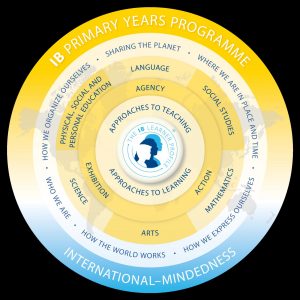PYP (Primary Years Programme)
Approaches to Learning
The students and teachers are continuing to explore the PYP framework in their learning. Over the course of the year, Prep Talk will explore each of the concentric circles that make up the PYP framework to provide a snapshot into how learning develops at NCL.
The PYP framework centres on transdisciplinary learning and is the curriculum organiser for our school and enables the students to experience learning between, across and beyond traditional subject boundaries. We strive towards deeper learning and the framework helps us to plan and develop learning that best fits the needs of our learners which includes the requirements of NESA (NSW Education Standards).
In the previous Prep Talk, the centre of the framework illustrated below, the Learner Profile, was the focus. This issue will emphasise Approaches to Learning (ATL, previously known as transdisciplinary skills). There is little difference, other than a change of name, so as to be in line with all IBO programmes. The ATLs are grounded in the belief that learning how to learn is fundamental to education. They complement the learner profile, knowledge, conceptual understanding and inquiry of the PYP.

Five categories of interrelated skills aim to support students to become a self-regulated learner who know how to ask good questions, set effective goals and pursue their aspirations with determination to achieve them. These skills also support students’ sense of agency, encouraging them to see their learning as an active and dynamic process.
At Lindfield, it is our aim to embed these five skill sets in authentic learning experiences. These skills support purposeful inquiry and set the foundations for lifelong learning. The five interrelated approaches to learning are:
- Thinking – critical thinking, creative thinking, transfer, reflection skills
- Research – information literacy, media literacy, ethical use of media skills
- Communication – exchanging information, literacy, ICT skills
- Social – interpersonal relationships, social-emotional intelligence
- Self-management – organisation, mindfulness skills.
Embedded within the ATL are digital literacy skills that can be an invaluable resource for information gathering or processing, as well as for critical and creative thinking, communication and collaboration. By combining ATL and the attributes of the learner profile, PYP students become self-regulated learners. Self-regulated learners are agents of their own learning. They know how to:
- set learning goals
- ask open-ended questions
- generate motivation and perseverance
- reflect on achievement
- try out different learning processes
- self-assess as they learn
- adjust their learning processes where necessary
(Zimmerman and Schunk 2001; de Bruin et al 2002; Wolters 2001).
They are a focus for learning with each unit targeting a number of the skills. This ensures that the students come to know, understand and practice them to achieve fluency in using them in a range of situations preparing them for life.
Sue Gough – PYP Co-ordinator






